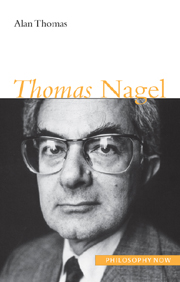Book contents
- Frontmatter
- Contents
- Preface
- Abbreviations
- 1 Subjective and objective
- 2 Understanding, knowledge and reason
- 3 Placing the mind in the physical world
- 4 The possibility of altruism
- 5 Practical objectivity, freedom and a realistic autonomy
- 6 Normative ethics: Nagel's hybrid ethical theory
- 7 Justice, equality and partiality
- Conclusion
- Notes
- Bibliography
- Index
7 - Justice, equality and partiality
- Frontmatter
- Contents
- Preface
- Abbreviations
- 1 Subjective and objective
- 2 Understanding, knowledge and reason
- 3 Placing the mind in the physical world
- 4 The possibility of altruism
- 5 Practical objectivity, freedom and a realistic autonomy
- 6 Normative ethics: Nagel's hybrid ethical theory
- 7 Justice, equality and partiality
- Conclusion
- Notes
- Bibliography
- Index
Summary
Nagel has made selective interventions in political philosophy throughout his career. Primarily, these have taken the form of individual, highly regarded papers that have had a transformative effect on such issues as positive discrimination, equality, the value of privacy and, most recently, global justice. In the later stages of his career he has turned his attention more consistently to political philosophy. His first book-length contribution to political theory originated as the Locke lectures at the University of Oxford; in a revised form they were published as Equality and Partiality. Since the publication of Equality and Partiality Nagel has continued to explore themes in the area between moral and political philosophy, and issues of political morality, and has also co-authored a second book on tax policy. However, Equality and Partiality expresses his views on political philosophy most comprehensively and also shows how he takes issues in political philosophy to be shaped by the overall conception of philosophy (particularly moral philosophy) that has been traced throughout this book. This closing chapter is devoted mainly to an analysis of its central argument.
In Equality and Partiality Nagel succeeded once more in saying strikingly original things about an area of philosophy so thoroughly explored that it seemed all options had been exhaustively discussed. Interestingly, it is the most general feature of his approach, the fact that Nagel clearly takes political philosophy to be continuous with moral philosophy, that is the basis of his originality.
- Type
- Chapter
- Information
- Thomas Nagel , pp. 207 - 232Publisher: Acumen PublishingPrint publication year: 2008

